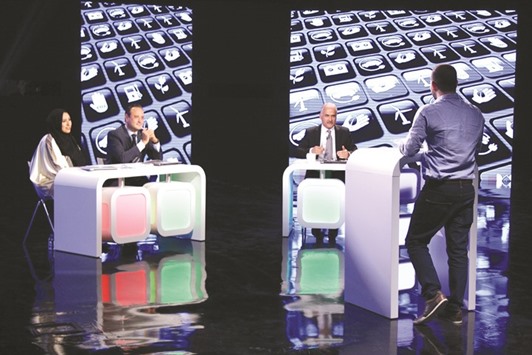Stars of Science, the Arab world’s popular ‘edutainment’ reality show developed by Qatar Foundation, showcased Season 8 hopefuls aiming to create solutions for the region with innovative ideas related to the energy and environment spheres.
Those who impressed the judges took one step closer to their goal of winning a share of $600,000 in seed funding to make their idea a reality.
Shortlisted innovators, though, need to wait for judgment in the Majlis episode (MBC4) today, at 10:30pm local time to see who is invited to continue the journey, according to a press statement.
Nineteen candidates from the first three casting episodes have now successfully triumphed over the competition for a spot in the Majlis episode. Their next challenge is to be chosen as one of only nine candidates to be invited to develop their inventions with the help of the experts who will all work from the Stars of Science laboratories at Qatar Science and Technology Park.
Candidates will compete in small groups to advance from the prototyping stages to the customer validation rounds, where they will work on developing their idea from prototype to fully-fledged product.
Arab innovators from across the Middle East arrived at the Stars of Science studio in Doha dreaming of being crowned the Stars of Science winner in November in front of millions. But first, each was challenged to convince a jury of experts to give them a chance at glory.
Aysha al-Mudahka, a Qatari catalyst with a keen eye for up-and-coming entrepreneurs, joined Professor Fouad Mrad for a third week in her role as a permanent juror. Currently the CEO of Qatar Business Incubation Centre, she is widely regarded as one of the most influential people in the Middle East’ entrepreneurship ecosystem.
Rounding out the trio of jurors was Dr Hosni Ghedira, an environmentalist who currently serves as professor of practice and director of the Research Centre for Renewable Energy Mapping and Assessment at Masdar Institute, Abu Dhabi.
“Our mission is clear – to find young Arab innovators with the skill, knowledge and spirit necessary to make a true difference with his or her idea,” noted al-Mudahka.
The three jury members had their hands full, judging the strengths and weaknesses of a diverse range of inventions.
The episode featured innovators whose devices proposed to solve problems in the energy and environment realm by utilising technology in a creative and novel way. Some inventions focused on solar energy and wind power solutions, while others aimed to address problems like air pollution and waste management. Professor Mrad was keen to remind candidates that in science, unlike other disciplines, there are right and wrong ways to solve a problem.
At the season finale, four final candidates left standing will receive a share of $600,000 in seed funding for their ideas. The winner will be chosen via a public and jury vote, and will be known across the region as the Arab world’s most promising young innovator.
Applications for Season 9 are now open for Arab nationals aged 18 to 35 years. One can visit www.starsofscience.com for more details.

Aysha al-Mudahka, Dr Hosni Ghedira and Prof Fouad Mrad lead the jury panel to cast ideas in the fields of energy and environment.
